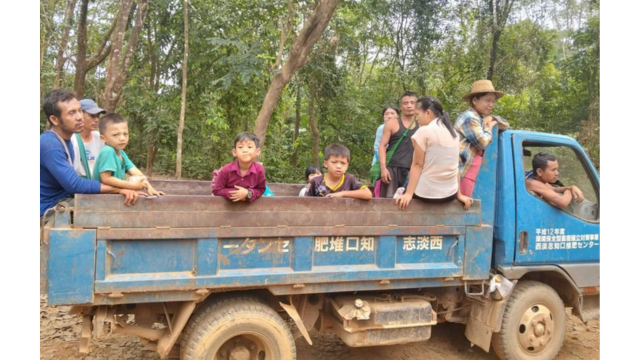
After a year marked by unprecedented violence and displacement, the Burma Army ended the year with an intensified campaign against civilians. Over the past two weeks, the Burma Army has launched a series of attacks using mortars, landmines, and airstrikes, causing widespread casualties among civilians. Among these assaults were targeted attacks on Christians on Christmas Day, which devastated villages, Internally Displaced Person (IDP) camps, and critical infrastructure, leaving a trail of destruction across multiple regions.
Field reports from Free Burma Rangers (FBR), a frontline faith-based aid organization, documented a number of attacks on Christmas Day. Bombings struck K’ Thuthi, a village north of Kamamaung, situated along the Salween River in central Karen State (Kayin State). According to an FBR team leader, Burmese aircraft conducted multiple bombing runs on the village, disrupting what should have been a peaceful holiday. The team leader remarked grimly, “They gave us Christmas presents,” but thankfully, there were no fatalities during these attacks.
In Ler Doh Township, on December 25, 2024, at approximately 6:05, Kyaw Pauk village came under fire. The Burma Army launched 120mm mortar shells from Natha Gwein, striking Kho village earlier in the morning and again in the evening. The second strike directly hit Kyaw Pauk village, killing two children and injuring a woman. The injured woman, Naw Dah Eh Say, 30 years old, suffered serious wounds. The two children killed were Naw Ku Dah, aged 12, and Naw Gay Dah Paw, aged 7. Their deaths on Christmas Day highlight the junta’ s ruthless disregard for human life.
Two days after Christmas, the Burma Army escalated its attacks with airstrikes in Southern Shan State. On December 27, 2024, at approximately 3:45 PM, a military jet fighter launched an assault on Pi King Village in Phekhon Township. The jet dropped two 500-pound bombs and fired four missiles, causing extensive destruction. The attack wounded three civilians, damaged three trucks, and destroyed eight houses. One civilian, riding a motorcycle at the time of the bombing, lost his hand to shrapnel. Karen Rangers, including the Phekhon team, quickly responded to the crisis, providing emergency aid, assisting in evacuations, and transporting injured individuals to safety.
These attacks, occurring around Christmas, align with Myanmar’ s military escalation of air and artillery strikes in 2024, which led to unprecedented civilian casualties. Since seizing power in 2021, the junta has destroyed more than 200 religious buildings, including Christian churches, seminaries, and even Buddhist monasteries and temples. A total of 5,489 civilians were killed or injured—1,769 deaths and 3,720 injuries—surpassing the combined casualties of the previous three years since the 2021 coup. Strikes targeted 12 of Myanmar’ s 14 regions, sparing only Yangon and Ayeyarwady, where the junta retains firm control. Key incidents included a 500-pound bomb dropped on Pi King Village and airstrikes in Sagaing’ s Yinmarbin Township on December 17, which killed five civilians and injured ten. Many of these attacks occurred in areas with no active fighting, indicating that civilians were likely targeted for perceived connections to anti-junta forces.
The military’ s reliance on air and artillery strikes reflects its inability to maintain control on the ground, as anti-junta forces gained strength and reclaimed significant territories in 2024. Despite these intensified strikes, the junta lost control of 94 townships and now governs less than half of Myanmar. Observers anticipate an increase in such attacks in 2025 as the military seeks to prevent further territorial losses. International arms sales and fuel supplies, primarily from China and Russia, have bolstered the junta’ s capabilities despite diplomatic efforts by the National Unity Government to cut off its resources. Without stronger action to curb the junta’ s access to supplies, activists warn that civilian suffering will only intensify.
David Eubank, the head of the Free Burma Rangers (FBR), has spent more than 25 years engaged in the conflict in Burma. Reflecting on the Burma military’ s ongoing attacks on civilians and Christians, he said, “The Burma military systematically targets civilians. In the last three years especially, thousands have been killed by airstrikes, drone strikes, artillery, mortar fire, and small arms attacks.”

Eubank detailed recent incidents in Karenni State, where civilians have borne the brunt of these assaults. “Just last week, there were two separate airstrikes on internally displaced persons (IDP) sites,” he said. “One struck Elephant Camp, northeast of Loikaw, and the other hit near the Shan-Karenni border by Pekon. Both attacks killed civilians, including children.” He noted ongoing violence, adding, “In Karenni State this week, multiple artillery strikes with 105mm and 122mm howitzers have maimed and wounded many, killing at least two children. Yesterday, a drone attack in Nangla District injured multiple civilians. There are regular drone attacks and airstrikes, along with mortar fire targeting villages.”
Eubank emphasized the deliberate nature of these assaults, stating, “The Burma army has burned down churches, schools, and monasteries over the last three years, killing thousands of civilians. These are purposeful acts, intended to eliminate resistance and crush hope. The military wants to cut off any support for those opposing them.”
He believes these actions stem from desperation within the regime. “The Burma army is doing this because they’ re afraid they’ re about to lose control of the country,” Eubank explained. “They are willing to sacrifice their own people to cling to power.”


